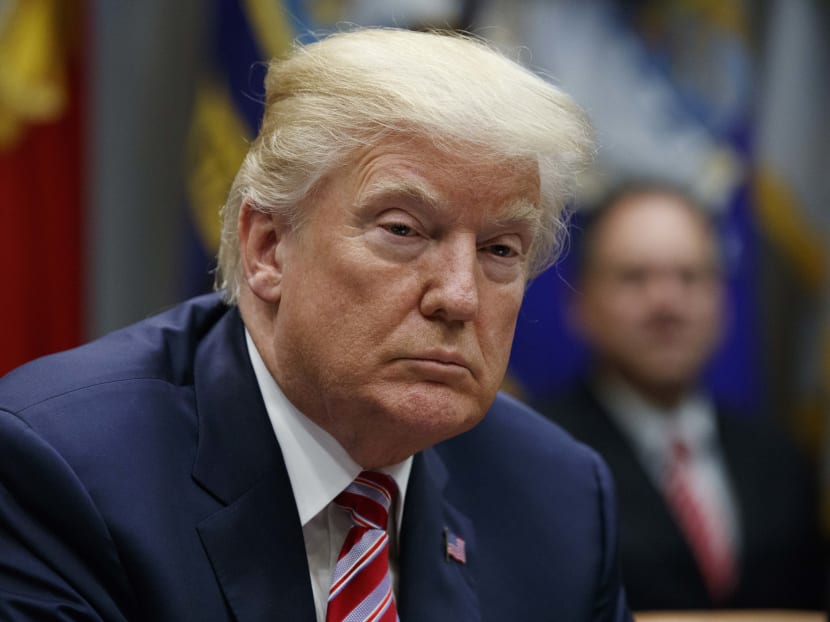Trump to push for more balanced trade ties and free markets in trip to Asia
SINGAPORE — Mr Donald Trump’s upcoming visit to Asia demonstrates his administration’s engagement of the region and his personal interest in helping it grow economically, said senior American officials, adding that the president will push for more equitable trade relations and for countries to adopt free-market principles.
SINGAPORE — Mr Donald Trump’s upcoming visit to Asia demonstrates his administration’s engagement of the region and his personal interest in helping it grow economically, said senior American officials, adding that the president will push for more equitable trade relations and for countries to adopt free-market principles.
“The President’s travel is going to underscore his commitment to longstanding US alliances and partnerships, and reaffirm US leadership in promoting a free and open Indo-Pacific region,” said a senior administration official at a White House media briefing on Mr Trump’s first official visit to Asia from Nov 3 to 14, which will include stops in South Korea, Japan, China, Vietnam, and the Philippines.
Mr Trump’s upcoming trip comes amid concerns of Washington’s disengagement from the region, especially after he withdrew the US from the Trans-Pacific Partnership (TPP) trade pact just days after his inauguration in January.
Seeking to allay such concerns, the official outlined the extensive links the Trump administration has established with the region, pointing out how Mr Trump has made 43 phone calls to leaders in the Indo-Pacific.
In addition, the president has held bilateral talks with the leaders of Japan, South Korea, China, India, Australia, Malaysia, Vietnam, Indonesia, Singapore, and Thailand.
The official noted that Mr Trump’s upcoming Asia visit will be the longest to the region by any US president in the past 25 years, adding that no President has also visited more countries in the region on any one trip since President George W Bush in October 2003.
“The President is making a long-term commitment to the region,” said a second administration official at Tuesday’s (Oct 31) briefing, adding that the countries he is visiting include some of America’s most important partners.
While in Vietnam and the Philippines, Mr Trump will attend the US-Asean Summit as well as Asia-Pacific Economic Cooperation (Apec) meetings, where he will give a speech outlining US’ vision for the Indo-Pacific region and the important role the region plays in advancing American prosperity and security.
“So I think this demonstrates a commitment to economic engagement across the region and his interest in helping all countries grow and thrive economically,” said the second official.
“To achieve this shared goal, I believe you’ll see an emphasis on a need for all countries to adopt economic policies based on free-market principles,” the official added.
“This means fully embracing an international trading system which is rules-based and respects high standards; achieving fair and equitable trade relationships through the removal of unfair trade barriers; and the reduction of chronic trade deficits and adherence to market-based growth.”
In an oblique reference to China, the official said that there are still countries which are resistant to opening their markets to others.
“This impedes growth. We need to see countries refrain from picking and promoting national champions at the expense of market-driven growth, and to stop trying to gain competitive advantage through stealing intellectual property, or demanding that innovators turn over their intellectual property as a price of doing business within their economies.”
The US has complained about its trade deficit with China, which stood at US$347 billion (S$472 billion) last year, and about China’s restrictions on access for foreign companies in sectors such as energy, telecommunications and cars.
In September, US Commerce Secretary Wilbur Ross hit out at China, calling it one of the most protectionist in the world as he criticised Chinese government subsidies to companies.
The White House said that during Mr Trump’s upcoming visit to China, a key message would be “the need to have a balance in the trading relationship for bilateral economic relations to be sustainable.”
“Progress on a range of bilateral economic issues has become increasingly difficult. We believe this reflects a slowdown and even a retreat in China’s move toward a market-oriented economy,” said the second senior administration official, who called for the removal of Chinese state subsidies to companies.
Asked whether America’s stance against trade barriers contradicted its pullout from the TPP, the officials said the 12-nation pact was intended to provide high standard provisions, but this objective was not fully achieved.
“And there’s also a strong concern with full adherence to the commitments. And the reality is that there are greater prospects through bilateral engagement, and greater -- higher standards can be achieved,” said one of the officials.
The White House also sought to downplay Mr Trump’s absence from the key East Asia Summit (EAS) on Nov 14 in the Philippines, saying that he will attend a “formal launch ceremony” of the EAS on Nov 13 where he will meet his counterparts from more than a dozen Asian nations as well as Australia, New Zealand and Russia.
Another US delegation will attend the summit proper the next day.
“So I don’t think it’s accurate to say he’s not going to be there. The meeting that happens on the 14th, the United States will be well represented at that meeting,” said one of the officials.
“ But that meeting does not account for the entirety of the EAS. The President has to come back to work. Again, this is the longest trip of his presidency, the longest trip in more than a quarter of a century to Asia. We can’t have him away from Washington forever.”







